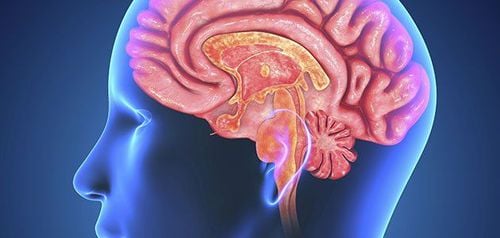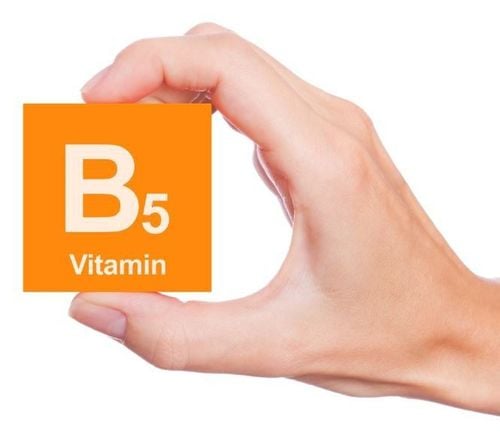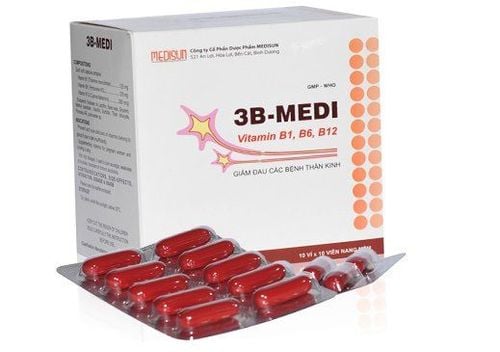This is an automatically translated article.
Vitamin B6 also known as pyridoxine is an essential water-soluble vitamin of the body. B6 is important for protein, fat, and carbohydrate metabolism and the creation of red blood cells and neurotransmitters. The body cannot produce vitamin B6, so you must get it from daily foods or supplements.1. May improve mood and reduce symptoms of depression
Vitamin B6 plays an important role in emotional regulation. This is in part because B6 is needed to make emotion-regulating neurotransmitters, including serotonin, dopamine, and gamma-aminobutyric acid (GABA).
Vitamin B6 may also play a role in reducing high blood levels of the amino acid homocysteine, which has been linked to depression and other mental problems.
Several studies have shown that depressive symptoms are related to low blood levels of vitamin B6, especially in elderly people at high risk of vitamin B deficiency. One study in 250 older adults found that low vitamin B6 levels doubled the risk of depression. However, using vitamin B6 to prevent or treat depression has not been shown to be effective.
2. May promote brain health and reduce risk of Alzheimer's disease
Vitamin B6 plays a role in improving brain function and preventing Alzheimer's disease, but research is mixed. On the one hand, B6 can reduce blood homocysteine levels, which may reduce the risk of Alzheimer's disease.
Vitamin B6 có thể làm giảm nguy cơ mắc bệnh Alzheimer
A study in 156 adults with high homocysteine levels and mild cognitive impairment found that taking high doses of B6, B12, and folate (B9) reduced homocysteine and reduced damage in certain brain regions that are susceptible have Alzheimer's. However, the study was not clear on whether lowering homocysteine levels would improve brain function or slow the rate of cognitive decline.
A randomized controlled trial of more than 400 adults with mild to moderate Alzheimer's found that high doses of B6, B12, and folate reduced homocysteine levels but did not slow the rate of decline in brain function compared with placebo group. Additionally, a meta-analysis of 19 studies concluded that B6, B12, and folate supplementation alone or in combination did not improve brain function or reduce the risk of Alzheimer's disease.
3. Can prevent and treat anemia by supporting the production of Hemoglobin
Due to the role of B6 in the production of hemoglobin, vitamin B6 has an important role in the prevention and treatment of anemia caused by insufficient nutrient intake.
Hemoglobin is a protein that delivers oxygen to your cells. When you have low hemoglobin, the cells don't get enough oxygen. As a result, you may become anemic and feel weak or tired.
Studies have linked low levels of vitamin B6 with anemia, especially in pregnant women and women of childbearing age. However, vitamin B6 deficiency is thought to be rare in most healthy adults, so there is limited research on the use of B6 to treat anemia.
Another study found that taking 75mg of vitamin B6 daily during pregnancy reduced symptoms of anemia in 56 pregnant women who did not respond to iron therapy.
More research is needed to understand the effectiveness of vitamin B6 in treating anemia in people other than those at risk for vitamin B deficiency, such as pregnant women and the elderly

Phụ nữ mang thai thuộc nhóm đối tượng có nguy cơ thiếu vitamin B
4. May be helpful in treating symptoms of PMS
Vitamin B6 has been used to treat symptoms of premenstrual syndrome (PMS), including anxiety, depression, and irritability. B6 helps improve emotional symptoms associated with PMS due to its role in the production of mood-regulating neurotransmitters.A three-month study in more than 60 premenopausal women found that taking 50mg of vitamin B6 daily improved PMS symptoms of depression, irritability, and fatigue by up to 69%. However, the women who received the placebo also reported improved PMS symptoms, which suggests that the effectiveness of vitamin B6 supplementation may be due in part to the placebo effect.
Another small study found that 50mg of vitamin B6 along with 200mg of magnesium per day significantly reduced PMS symptoms, including mood swings, irritability, and anxiety, over the course of a menstrual cycle.
Although these results are promising, studies are limited by small sample sizes and short duration. More research is needed on the safety and effectiveness of vitamin B6 in improving PMS symptoms before recommendations can be made.
5. May help with nausea during pregnancy
Vitamin B6 has been used for decades to treat nausea and vomiting during pregnancy. In fact, B6 has an ingredient in Diclegis, a medication commonly used to treat morning sickness.

Phụ nữ gặp tình trạng nôn nghén khi mang thai có thể sửa dụng vitamin B6 theo chỉ định của bác sĩ
Researchers are not entirely sure why vitamin B6 helps with morning sickness, but it may be because getting enough B6 is important in ensuring a healthy pregnancy.
A study in 342 women during the first 17 weeks of pregnancy found that a daily supplement of 30 mg of vitamin B6 significantly reduced feelings of nausea after five days of treatment, compared with a placebo.
Another study compared the effects of ginger and vitamin B6 on reducing episodes of nausea and vomiting in 126 pregnant women. Results showed that taking 75 mg of B6 per day reduced nausea and vomiting symptoms by 31% after four days.
These studies show vitamin B6 to be effective in treating morning sickness, even for less than a week.
6. Can prevent clogged arteries and reduce the risk of heart disease
Vitamin B6 can prevent blood clots and reduce the risk of cardiovascular disease. Research shows that people with low blood levels of vitamin B6 have nearly twice the risk of cardiovascular disease as those with higher levels of B6.
This may be due to the role of B6 in reducing homocysteine levels in relation to a number of pathological processes including cardiovascular disease.
One study found that vitamin B6-deficient rats had higher blood cholesterol levels and developed lesions that can block arteries after exposure to homocysteine, compared with mice with balanced B6 levels. Human studies also show beneficial effects of B6 in preventing cardiovascular disease.
A randomized controlled trial in 158 healthy adults with a sibling with cardiovascular disease was divided into two groups, one receiving 250mg of vitamin B6 and 5mg of folic acid daily for two years and one group another received a placebo.
The group taking B6 and folic acid had lower homocysteine levels and less abnormal heart tests than the placebo group, leading to a lower risk of cardiovascular disease.

Bổ sung vitamin B6 hợp lý giúp giảm nguy cơ mắc bệnh tim
7. May Help Prevent Cancer
Getting enough vitamin B6 may reduce the risk of developing some types of cancer. The reason why B6 might help prevent cancer is still unclear, but researchers think it is linked to its ability to fight inflammation and other chronic diseases.
A meta-analysis of 12 studies found that both an adequate diet and blood levels of B6 were associated with a lower risk of colorectal cancer. People with the highest blood levels of B6 had a nearly 50% lower risk of developing this type of cancer.
Research on vitamin B6 and breast cancer also shows an association between blood levels of B6 and a reduced risk of the disease, especially in postmenopausal women. However, other studies on vitamin B6 levels and cancer risk have not shown any association between vitamin B6 and cancer risk.
8. Can improve eye health and prevent eye diseases
Vitamin B6 may play a role in preventing eye diseases, especially a vision loss condition that affects the elderly known as age-related macular degeneration. AMD - AMD).
Studies show an association between high blood homocysteine levels and AMD risk. Because vitamin B6 helps reduce homocysteine levels in the blood, getting enough B6 may reduce the risk of this condition.
A 7-year study of more than 5,400 female health professionals found that daily vitamin B6, B12, and folic acid (B9) supplements significantly reduced the risk of AMD by 35-40%, compared with placebo.
In addition, research has also shown an association between low blood levels of vitamin B6 and blockages in the veins that circulate blood in the retina. A controlled study in more than 500 people found that the lowest blood levels of B6 were significantly associated with retinal disorders

Vitamin B6 giúp người dùng ngăn ngừa các bệnh về mắt
9. Can treat inflammation in rheumatoid arthritis
Vitamin B6 may help reduce symptoms associated with rheumatoid arthritis. Increased levels of inflammation in the body due to rheumatoid arthritis can lower vitamin B6 levels.
However, it is not clear if B6 supplementation can reduce inflammation in people with rheumatoid arthritis. A 30-day study in 36 adults with rheumatoid arthritis found that a daily supplement of 50mg of vitamin B6 helped regulate blood levels of B6 but did not reduce the body's production of inflammatory substances. On the other hand, a study in 43 adults with rheumatoid arthritis taking only 5 mg of folic acid or a combination of 100 mg of vitamin B6 with 5 mg of folic acid per day found that those receiving B6 had lower levels of inflammatory substances. significantly more after 12 weeks. The conflicting results of these studies may be due to differences in vitamin B6 doses and study duration. While it appears that high-dose vitamin B6 supplements may offer anti-inflammatory benefits for people with rheumatoid arthritis over time, more research is needed.
10. Food sources of vitamin B6
You can get vitamin B6 from daily foods or supplements. The current recommended daily intake for B6 is 1.3 to 1.7 mg in people over 19 years of age. Most healthy adults can get their recommended amount of B6 through their daily diet from foods rich in vitamin B6 such as turkey, chickpeas, tuna, salmon, potatoes, and bananas.
11. Side Effects of Too Much Vitamin B6
Getting too much vitamin B6 from dietary supplements can cause negative side effects. Taking more than 1,000 mg of B6 supplements per day can cause nerve damage and pain or numbness in the hands or feet. Some of these side effects have even been documented at levels between 100 and 300 mg of B6 per day.
Trước khi sử dụng vitamin B6, người dùng cần được tư vấn về cách dùng thuốc an toàn
For these reasons, the tolerable upper limit of vitamin B6 is 100 mg per day for adults. The amount of B6 used to treat certain health conditions rarely exceeds this number. If you are concerned about taking more than the upper limit, consult your doctor.
Please dial HOTLINE for more information or register for an appointment HERE. Download MyVinmec app to make appointments faster and to manage your bookings easily.
Reference source: healthline.com












